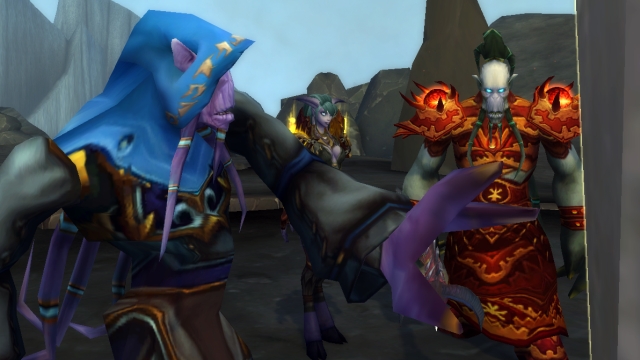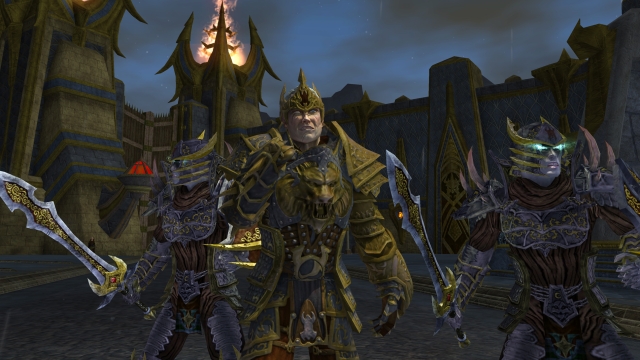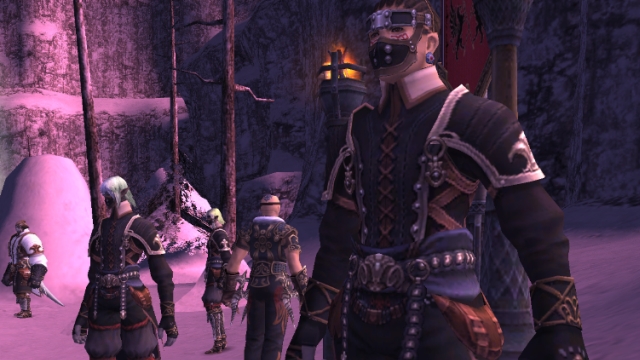When you first form a guild, it’s with the intent that you’ll be playing and adventuring with all of these fellow players for an extended period of time. But sometimes that proves to be… let’s say… optimistic. Sometimes, after a year of all playing as a single group, it becomes clear that you’re really hosting two entirely different guilds under the same roof, and you’d rather form two entirely different guilds in actuality rather than just having the split in principle.
All of this is understandable. What gets complicated is actually doing that.
In a perfect world, there would just be a button one could push that would split the guild and be done with it, but in a perfect world we would also be able to fly, shapeshift, and have a ready array of cats to cuddle whenever necessary. We do not live in a perfect world and don’t even have any perfect virtual worlds. So let’s get into the gritty details of what it means when it’s time to split your guild.
Identifying where the split should be
We’re going to skip over the step where you determine whether or not your guild does need to be split; it can be safely assumed that if you’re at this point in the discussion, you at least have a moderate inkling that a split would be a good thing on the whole. So let’s start with the step where you sit down with the other officers, talk about it, and figure out where the split should be taking place.
The biggest thing to note with guild splits is that it’s not simply a matter of different parts of the guild having a different focus. For a split to be merited, you need to have parts of a guild which are actively not helping or harming one another. Having cliques within a larger guild, for example, is an inevitability, but if there’s one main clique that’s deforming the very nature of the guild as a whole, you’ll want to address that. It may even be that that clique wants to split away in the first place, in which case there’s far less discussion that needs to happen.
During this part of the process, you want everyone to ultimately be happy with the changes being proposed. Your end goal is that after a split, your World of Warcraft guild no longer has an unhappy group of hardcore progression raiders and an unhappy group of casual dungeon-runners. Even before you get into any of the mechanics, make sure that this seems like something people are responding to with positivity.

Decide which officers go where
Part of what makes a guild is leadership, and if you have a group that could split away, the leadership is most likely the reason why they haven’t. Sure, there are people who will just stick around with a crap guild for ages out of pure momentum, but if you have a League of Legends team with members who don’t mesh together, there’s something keeping them from all packing up shop. In other words, these players like the guild leadership, and that means some of the officers are going to stick around with both of the split guilds.
Sometimes, this is an easy decision to make. If Sandra and Fred are pushing for the more competitive side of the team while you and Mila are on the more casual play side, it’s pretty obvious who will wind up where. But sometimes the clique is devoid of officers, or there’s only one officer for a rather sizable clique. You don’t want to send officers somewhere they won’t enjoy post-split, but you also want to retain the flavor of the guild.
The key, then, is finding people to take up the cause. Just setting out a bunch of people without any officers is more like a mass excommunication than a split; it creates feelings of bitterness. In the worst possible situations, a couple of officers from the original guild can join on with the split guild for a few months, help find new officers among the rank, and maintain a dual membership until the separate guild is ready to start running itself.
That will require close communication… but then, you want that anyway.
Find out what goes where
In the case of cliques, it’s usually pretty easy to know who is going where. The clique gets its own group, everyone else stays with the main group. A bit simplistic, perhaps, but at least it’s straightforward. But even when it seems obvious, it rarely works out that way.
Once you’ve got the core question of membership sorted, it’s important to start drawing up statements of focus for the newly split guild and find out where players want to go. It could be that someone who isn’t really into progression raiding to your memory is actually really interested in being a part of that group, or someone who you knew would want to be part of progression actually just got swept up in things and would rather stay with the main body of the guild. It’s important to ask and consider before the split happens.
In games wherein guilds have a benefit to them, it’s also important to decide who is getting what. Your World of Warcraft guild has resources in the bank that players might want, your Star Wars: The Old Republic guild has its fleet flagship, and so forth. Splitting your guild means those resources are going somewhere, and sometimes it might be best if the “split” guild retains the original stuff and the “core” guild migrates. It’s something to discuss and plan out based on which group has the greatest need of whatever is being given up; you want to be fair to all members as much as you can.
And that’s not something that stops once the split happens, either…

Maintain a relationship
You are not throwing a bunch of people out when you take this option, you are making a new guild to house players who are unhappy in the main guild and possibly making other members unhappy. So it’s important to focus upon that by making sure that the split isn’t followed by a wave and a half-hearted wish of good luck. Even though the guild has split, you’re still linked, and the members who were welcome in the original guild are still welcome in now if things happen.
For at least the first few months, you’ll want to see how both halves of the guild are doing. It may turn out that the guild worked better with seemingly separate interests jutting up against one another, and it may also turn out that one guild is really faltering. If the split doesn’t work, you want to be ready to re-merge and get back on with business as usual, hopefully with a better understanding of what makes the guild as a whole work.
Even if the split happens and everything goes fine, you want a positive relationship because you both came from the same spot and offer things the other one does not. Maybe someone applied to your guild looking for something you don’t really offer. With a split, you know people who are close to your guild while offering a different overall focus. Isn’t that something worthwhile?
Splits aren’t always easy, but they’re often a constructive solution for guilds that just don’t have the unity of focus that a good guild needs. By being careful during the split process, you make sure that both halves remain excited and invested in the well-being of one another, and you’ll end up with a stronger overall setup in the end.







Published: Apr 6, 2016 09:58 am